最新译林牛津版初中英语九年级上册Unit 3 Teenage problems Integrated skills导学案
牛津译林版九年级上册9AUnit3 Teenage problems词汇趣味讲解(配练习含答案)
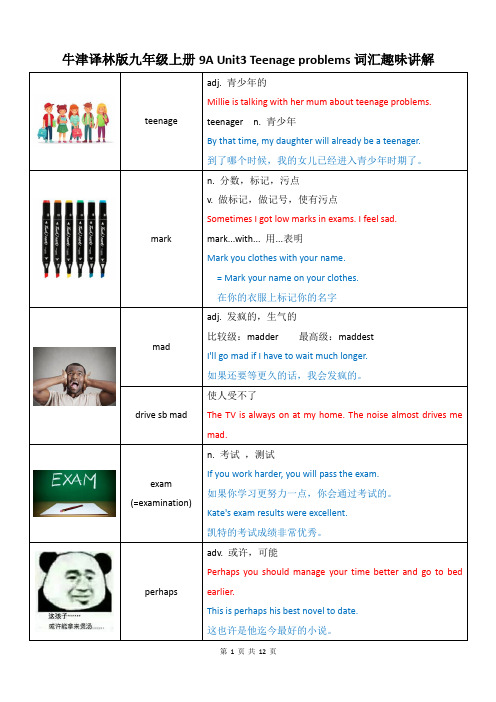
牛津译林版九年级上册9A Unit3 Teenage problems词汇趣味讲解teenage adj. 青少年的Millie is talking with her mum about teenage problems. teenager n. 青少年By that time, my daughter will already be a teenager. 到了哪个时候,我的女儿已经进入青少年时期了。
mark n. 分数,标记,污点v. 做标记,做记号,使有污点Sometimes I got low marks in exams. I feel sad. mark...with... 用...表明Mark you clothes with your name.= Mark your name on your clothes.在你的衣服上标记你的名字mad adj. 发疯的,生气的比较级:madder 最高级:maddest I'll go mad if I have to wait much longer. 如果还要等更久的话,我会发疯的。
drive sb mad 使人受不了The TV is always on at my home. The noise almost drives me mad.exam (=examination) n. 考试,测试If you work harder, you will pass the exam.如果你学习更努力一点,你会通过考试的。
Kate's exam results were excellent.凯特的考试成绩非常优秀。
perhaps adv. 或许,可能Perhaps you should manage your time better and go to bed earlier.This is perhaps his best novel to date.这也许是他迄今最好的小说。
最新牛津译林版九年级英语上册《Unit 3 Teenage problems VOCABULARY》精品课件
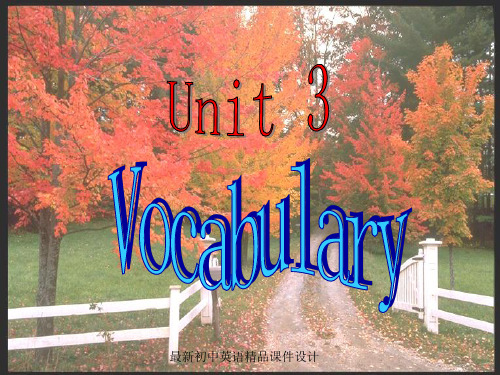
I usually join in some activities after school, and then I (3) __________ home. There’s always a lot of traffic on the road and I usually (4) ____________. I don’t have much time to revise for tests. Sometimes I don’t (5) ______________, and I fe sad then.
get a bus
get home
get low marks
get to sleep 最新初中英语精品课件设计get angry
get a letter
最新初中英语精品课件设计
Task1 – Fill the blanks
get / _ta_k__e_a bus get/_b_e_c_o_m_e_angry get/a_c_h__ie_v_e_low
marks
get/_h_a_v_e_ a lot get / _a_r_r_iv_e_home get /r_e_c_e_iv_e_a letter
of homework 最新初中英la语t精e品课件设计
请用英语解释划线的单词
1)How much did you get that skirt?
2) Go and get your breakfast.
12.get sth for sb
为某人拿/取某物
最新初中英语精品课件设计
选用所给词组的适当形式填空
get on well with, get off ,get through, get together, get to,
江苏省句容市天王中学九年级英语上册《Unit 3 Teenage
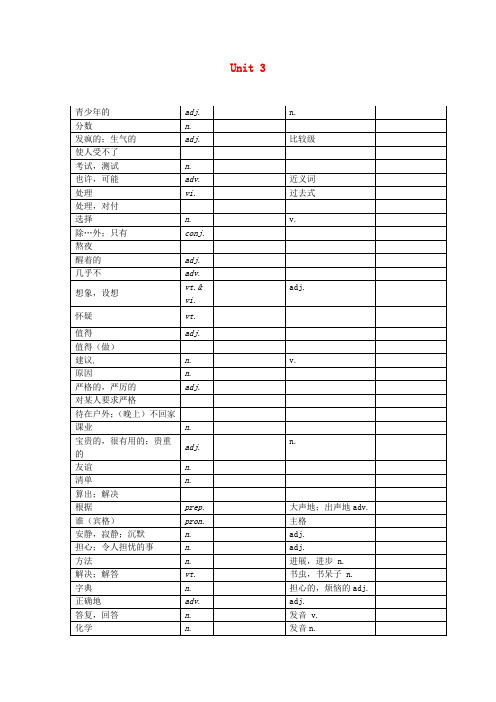
Unit 3青少年的adj. n.分数n.发疯的;生气的adj. 比较级使人受不了考试,测试n.也许,可能adv. 近义词处理vi. 过去式处理,对付选择n. v. 除…外;只有conj.熬夜醒着的adj.几乎不adv.想象,设想vt.&vi.adj.怀疑vt.值得adj.值得(做)建议n. v. 原因n.严格的,严厉的adj.对某人要求严格待在户外;(晚上)不回家课业n.宝贵的,很有用的;贵重的adj.n.友谊n.清单n.算出;解决根据prep. 大声地;出声地adv. 谁(宾格)pron. 主格安静,寂静;沉默n. adj.担心;令人担忧的事n. adj.方法n. 进展,进步 n.解决;解答vt. 书虫,书呆子 n.字典n. 担心的,烦恼的adj. 正确地adv. adj.答复,回答n. 发音 v.化学n. 发音n.九上Unit3 必背短语主备人:罗云林海春1 teenage problems 青少年问题2 eat too much 吃太多3 have enough time to do my homework 有足够的时间做我的家庭作业4 be always on 一直开着5 drive sb mad 使某人发疯6 have some close friends to talk to 有一些可以交谈的亲密朋友7 get low marks in exams 在考试中取得低分8 have time for me. 有时间陪我9 manage your time bett er 更好地管理你的时间10 ask sb. for some advice 向某人寻求建议11 have no choice but to do sth 没有其他选择只能做某事12 stay up 熬夜13 find it hard to stay awake 发现保持清醒很难14 have spare time for my hobbies 有空余时间进行我的爱好梦想一个没有作业的长假期15 dream of a long holiday withouthomework16 offer me some suggestions 提供给我一些建议17 be crazy about football 对足球很痴迷18 become the cause of my problem 成为我的问题的起因19 get into trouble 陷入麻烦20 allow me to play outside after 6 pm 允许我晚上6点后在外面玩21 be strict with sb in sth 在某方面对某人要求严格22 help us relax 帮助我们放松在…和…之间取得平衡23 achieve a balance between my …and …24 according to 根据25 have difficulty expressing myself 表达我自己有困难26 one of the top students 尖子生中的一个27 laugh at her 嘲笑她28 call her a bookworm 叫她书虫29 pay no attention to those classmates 不要在意那些学生30 make little progress 几乎没有取得进步尽可能经常地31 as often as possible =as often as sbcan32 Don’t mention it. 不用谢。
牛津译林版九年级上册Unit3《Teenageproblems》(Task)说课稿

牛津译林版九年级上册Unit 3《Teenage problems》(Task)说课稿一. 教材分析《Teenage problems》是牛津译林版九年级上册Unit 3的一篇课文,主题是关于青少年问题的。
通过描述青少年在成长过程中所面临的各种问题,如学习压力、与父母关系、朋友关系等,让学生了解并关注这一年龄段所特有的困惑和挑战。
本节课的主要目标是让学生能够理解课文内容,掌握相关的语言知识,提高阅读理解能力。
二. 学情分析九年级的学生已经具备了一定的英语基础,能够听、说、读、写一些简单的英语句子。
但他们在阅读理解方面还存在一定的困难,特别是对于一些长篇的文章。
因此,在教学过程中,我们需要关注学生的阅读理解能力,引导他们通过关键词、句子来理解文章的大意。
三. 说教学目标1.知识目标:让学生掌握课文中的关键词汇和句型,提高阅读理解能力。
2.能力目标:培养学生通过关键词、句子来理解文章大意的技巧。
3.情感目标:让学生认识到青少年时期所面临的问题,引导他们正确面对和处理这些问题。
四. 说教学重难点1.重点:课文的理解和相关的语言知识的掌握。
2.难点:对于一些长篇的文章,学生如何通过关键词、句子来理解文章的大意。
五. 说教学方法与手段1.教学方法:采用任务型教学法,让学生在完成任务的过程中,提高阅读理解能力。
2.教学手段:利用多媒体课件,为学生提供丰富的视觉、听觉材料,激发学生的学习兴趣。
六. 说教学过程1.导入:通过提问方式,引导学生谈论青少年时期所面临的问题,激发学生的学习兴趣。
2.阅读理解:学生自主阅读课文,回答相关问题,教师给予指导。
3.单词学习:学生通过课文,学习并掌握相关的词汇。
4.句型练习:学生模仿课文中的句型,进行口语练习。
5.小组讨论:学生分组讨论,分享自己面临的青少年问题,并尝试寻找解决办法。
6.总结:教师引导学生总结课文内容,加深对文章主题的理解。
7.作业布置:让学生写一篇关于自己青少年问题的文章,培养写作能力。
牛津译林版九年级上册Unit 3《Teenage problems》(Study skills)教案
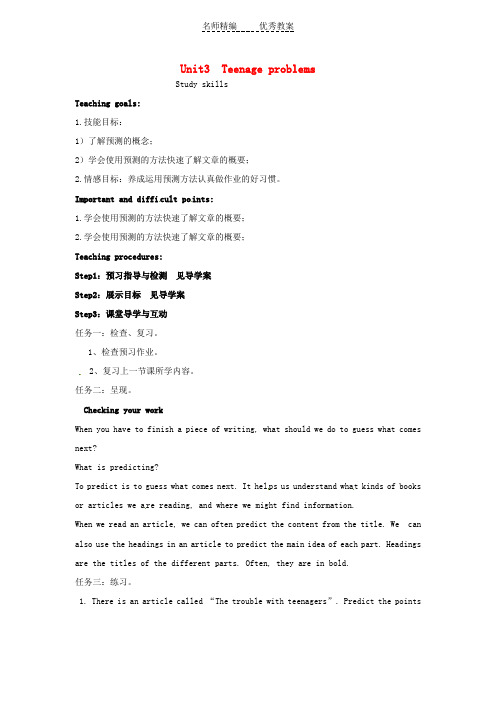
Unit3 Teenage problemsStudy skillsTeaching goals:1.技能目标:1)了解预测的概念;2)学会使用预测的方法快速了解文章的概要;2.情感目标:养成运用预测方法认真做作业的好习惯。
Important and diffi cult po ints:1.学会使用预测的方法快速了解文章的概要;2.学会使用预测的方法快速了解文章的概要;Teaching procedures:Step1:预习指导与检测见导学案Step2:展示目标见导学案Step3:课堂导学与互动任务一:检查、复习。
1、检查预习作业。
2、复习上一节课所学内容。
任务二:呈现。
Checking your workWhen you have to finish a piece of writing, what should we do to guess what comes next?What is predicting?To predict is to guess what comes next. It hel ps us understand what kinds of books or articles we a re reading, and where we might find information.When we read an article, we can often predict the content from the title. We can also use the headings in an article to predict the main idea of each part. Headings are the titles of the different parts. Often, they are in bold.任务三:练习。
1. There is an article called “The trouble with teenagers”. Predict the pointsthat will be talked about in the article and tick (√) the correct boxes (Part A on page 45).Check the answers.Say:To get a general idea of a book or an article, we should ask some basic questions. If we predict the answers that the questions might have, it will help us find th e answers more quickly and easily when we read in detail.2. Millie is reading an art icle in Teenage magazine. Match her questions with your predicted answers. Write the correct letter in each blan k (Part B on page 45) .2、两人一组讨论。
牛津译林版九年级英语上册 Unit 3 Teenage problems Integrated
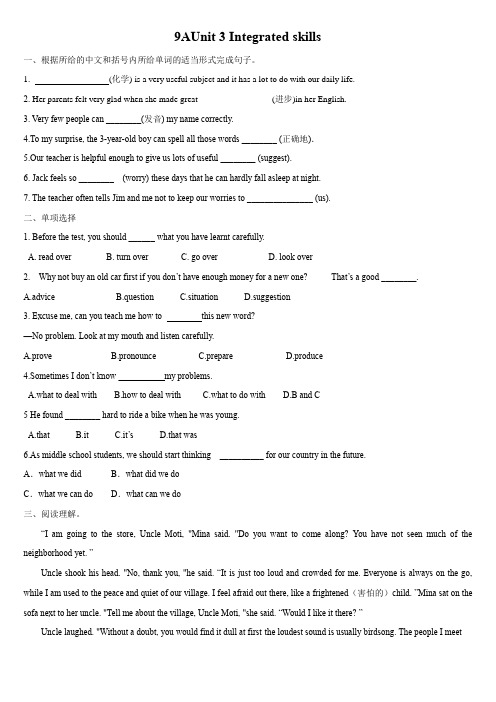
9AUnit 3 Integrated skills一、根据所给的中文和括号内所给单词的适当形式完成句子。
1. (化学) is a very useful subject and it has a lot to do with our daily life.2. Her parents felt very glad when she made great_________________(进步)in her English.3. Very few people can ________(发音) my name correctly.4.To my surprise, the 3yearold boy can spell all those words ________ (正确地).5.Our teacher is helpful enough to give us lots of useful ________ (suggest).6. Jack feels so ________ (worry) these days that he can hardly fall asleep at night.7. The teacher often tells Jim and me not to keep our worries to _______________ (us).二、单项选择1. Before the test, you should ______ what you have learnt carefully.A. read overB. turn overC. go overD. look over2.---Why not buy an old car first if you don’t have enough money for a new one? --- That’s a good ________.A.adviceB.questionC.situationD.suggestion3. Excuse me, can you teach me how to this new word?—No problem. Look at my mouth and listen carefully.A.proveB.pronounceC.prepareD.produce4.Sometimes I don’t know __________ my problems.A.what to deal withB.how to deal withC.what to do withD.B and C5 He found ________ hard to ride a bike when he was young.A.thatB.itC.it’sD.that was6.As middle school students, we should start thinking __________ for our country in the future.A.what we did B.what did we doC.what we can do D.what can we do三、阅读理解。
牛津译林版九年级英语上册Unit 3 Teenage problems全单元导学案
牛津译林版九年级英语上册Unit 3 Teenage problems全单元导学案 Period 1 Comic strip and Welcome to the unit一、目标导学1、帮助学生学会谈论青少年在学习,交友,家庭关系等方面所遇到的问题。
2、帮助学生学会思考个人问题及解决方法。
3、掌握本课时出现的重要语言点。
二、自学助思1、自学P6-7页生词,掌握单词(短语)的正确读音,了解词义及单词词性。
四会单词:mark______________ mad______________exam______________ perhaps ___________________四会短语:get fat _________________ get enough sleep ________________drive me mad ________________ close friends ____________________get low marks in exam___________ manage your time better __________四会句型:Why not eat less and exercise more?They don’t have time for me.2、大声朗读P34-35页内容,找出下列重点句型并试着翻译成中文。
(1)I’m getting fat.(2)Why not eat less and exercise more?(3)I don’t have e nough time to do my homework.(4)Perhaps you should manage your time better and go to bed earlier.三、群学导引1.Free talk : T-Ss :Talk about their problems.2.Pair work: T asks Ss to work in pairs. Describe their good friend’s problems.3. P7 Part A : S /Ss : The students should finish it individually ; Read it aloud and check theanswers.4.P 7 Part B : (1) T-ss: T asks the Ss to listen to the tape and try to answer some Qs.(2) Ss: Listen to the tape and read it loudly.(3) Free talk: Ss: work in pairs or groups: make their own dialogues.(4) Ss Share their performance.ic strip: (1) T-ss : Play the tape , the Ss should listen carefully and try to find out the answer to the questions: 1.Why is Eddie getting fat?2. What is Hobo’s suggestion?3. Why does Hobo tell Eddie not to eat too much?(2) Ask the students to act it out,help them if necessary.课堂达标检测一、翻译下列短语。
九年级英语上册 Unit 3 Teenage problems Integrated skills极
Unit 3 Teenage problems Integrated skills教学目标:1. 能从听力材料中获取相关信息来完成笔记。
2. 能正确地看待自己的问题,找到合适的解决方法。
重点重点:听力技巧指导。
重点句子:I’ve made little progress in my English.Perhaps you should go over what you’ve learnt as often as possible. Try to pronounce all the words correctly.Don’t mention it.【课前导学】:1. What problems do you have?______________________________________________________________________________ 2. Do you have any good ideas to deal with them?_______________________________________________________________________________ ______________________________________________________________________________ 【课堂练习】:Step 1. Speak up1. Talk about your own problems.2. Read the conversation and answer the questions.3. Learn some useful expressions, then make new conversations.Step 2. Listening.3. Listen to Part A2,choose the correct answers:( ) Nora isn’t good at sports, because she________.A. can run fast.B. can’t swim fast.C. dislikes swimming.D. doesn’t enjoy the exercise.( ) Why doesn’t Nora have any good friends? Because _________.A. she isn’t friendly.B. she is a bookworm.C. she doesn’t like to study.D. h er classmates laugh at her.( ) Which of the following suggestion is NOT true?A.Talk to your best friend when feeling sadB. Share your problems with your best friendC. Pay attention to those students who laugh at youD. Be proud of your schoolwork4. Listen again, complete Part A2 on Page 43.5. Finish Part A3.Ste p 3 Language points:1. I’m very worried. 我非常担心。
牛津译林版英语9A-Unit-3-知识点总结解析
--You look very sad,what’s wrong?你看起来很伤心,怎么了?
--My father is ill.我父亲生病了。
【拓展】What’s wrong?也可用于询问某物出了什么毛病,可在其后加with sth.
We all went to the cinema except Tom. He was ill.除了汤姆,我们都去看电影了。他生病了。
Amy has another two good friends besides you.除了你之外,诶米还有两个好朋友。
3.I often have to stay up late。我经常不得不熬夜到很晚。
hardly副词,意为“几乎不”,相当于almost not,用于连系动词、助动词或情态动词之后,实义动词之前。
I hardly ate anything last night.我昨天晚上几乎什么也没吃。
This year’s exam was much harder than last year’s.今年的测试比去年的难得多。
What did you do with your old bike?你怎么处理得你的旧自行车?
2….I have no choice but to do it。…我别无选择,只能去做。
have no choice but to do sth.意为“别无选择,只能去做某事”
She has no choice but to study hard.她别无选择,只能努力学习。
except除…之外(不再有)指从整体排除except后的人或物,常与all,everybody,everything等连用
牛津译林版英语九上9aunit3teenageproblemsintegratedskills
Trytopronounceallthewordscorrectly.
Usefulexpressions
1.howtoexpressfeelings I’mveryworried(about…). Ifeelangry/sad/…. 2.howtoaskforadvice Doyouhaveanysuggestions? Canyouoffermesomeadvice? WhatshouldIdo? Whatelse?
3.WhatsuggestionsdoesMilliegivehim? Gooverwhathehaslearntasoftenaspossible.
ReadEnglishaloudeverymorning.
Trytopronounceallthewordscorrectly.
progress [ˈprəuɡres] n.进展,进步
Pairwork
Makeupyourowndialogues.Taketurnstoshareyo urproblemsandgivesuggestions.
A:I…. B:Don’tworry. A:Isee.Doyouhaveanysuggestions? B:… A:That’sagoodidea.Whatelse? B:… A:Thankyou. B:…
Rememberthefollowingphrases:
• 1.oneofthetopstudents • 2.gethighmarksinexams • ughat • 4.callsbabookworm • 5.whenfeelingsad • 6.paynoattentionto • 7.beproudof • 8.makehimfeelsad • 9.seemmuchhappierthanbefore • 10.shareworrieswithothers
- 1、下载文档前请自行甄别文档内容的完整性,平台不提供额外的编辑、内容补充、找答案等附加服务。
- 2、"仅部分预览"的文档,不可在线预览部分如存在完整性等问题,可反馈申请退款(可完整预览的文档不适用该条件!)。
- 3、如文档侵犯您的权益,请联系客服反馈,我们会尽快为您处理(人工客服工作时间:9:00-18:30)。
Unit 3 Teenage problems Integrated skills 教学目标: 1. 能从听力材料中获取相关信息来完成笔记。 2. 能正确地看待自己的问题,找到合适的解决方法。 重点重点:听力技巧指导。 重点句子:I’ve made little progress in my English. Perhaps you should go over what you’ve learnt as often as possible. Try to pronounce all the words correctly. Don’t mention it. 【课前导学】: 1. What problems do you have? ______________________________________________________________________________ 2. Do you have any good ideas to deal with them? _____________________________________________________________________________________________________________________________________________________________ 【课堂练习】: Step 1. Speak up 1. Talk about your own problems. 2. Read the conversation and answer the questions. 3. Learn some useful expressions, then make new conversations. Step 2. Listening. 1. Listen to the tape, complete the table below: Nora in Grade _____________ loves English, Maths and__________________ do well in ______________________ one of the ___________ students problems not very goo at _____________ don’t have many ________ friends hopes make ________ ___________ 2. Finish Part A1 on Page 43. 3. Listen to Part A2,choose the correct answers: ( ) Nora isn’t good at sports, because she________. A. can run fast. B. can’t swim fast. C. dislikes swimming. D. doesn’t enjoy the exercise. ( ) Why doesn’t Nora have any good friends? Because _________. A. she isn’t friendly. B. she is a bookworm. C. she doesn’t like to study. D. her classmates laugh at her. ( ) Which of the following suggestion is NOT true? A. Talk to your best friend when feeling sad
B. Share your problems with your best friend C. Pay attention to those students who laugh at you D. Be proud of your schoolwork 4. Listen again, complete Part A2 on Page 43. 5. Finish Part A3. Step 3 Language points: 1. I’m very worried. 我非常担心。 worried adj. 担心的, 烦恼的 可用于系表结构, 主语一般是人。 be worried about sth. /sb worrying adj. 令人担忧的, 令人担心的 主语一般为事物。 worry v. 担心 worry (about) sth./ sb. 2. Perhaps you should go over what you’ve learnt as often as possible. 也许你应该尽可能多地复习你已经学习过的知识。 go over 复习; 回顾 e.g. 考试前复习课文。_______________________________ 3. How about reading English aloud every morning? aloud/loud/loudly aloud是副词, 与read, think 连用时, 表示“出声读”或“把想到的自言自语地说出来”, 不涉及声音的大小。当aloud与shout等词连用时, 才表示“大声地”。它通常放在动词之后, 没有比较级和最高级形式。例如: Don’t read aloud in the reading room. Most of the children and the old people like to think aloud. She shouted aloud when she saw her lost son. loud 可作形容词或副词, 表示“高声的(地), 响亮的(地)”。当它作形容词时, 可作表语或定语; 当它作副词时, 常与speak, talk等词连用, 强调状态和给人的感觉, 通常放在动词之后, 有比较级和最高级形式。例如: The noise is loud enough to wake us up. The man has a loud voice. The teacher told us to speak a little louder. Don’t talk so loud. loudly 是副词, 有时可与loud 通用, 但比loud更正式些, 常位于动词之后, 有比较级和最高级形式。例如: Don’t talk so loudly. “Listen!” he said more loudly than ever. “That’s not true! 4. Try to pronounce all the words correctly. 努力把所有单词读正确。 correctly adv. 正确地 correct adj. 正确的; 恰当的e.g. the correct answer 正确答案 v. 改正; 纠正 e.g. correct mistakes 改正错误 5. Don’t mention it. 不客气。 mention vt. 提及; 说起 同样的说法还有: With pleasure. / You’re welcome. / That’s all right 【课后拓展】 一、根据句意及汉语提示, 写出所缺单词。 1. The teacher is teaching us how to __________(发音) these new words. 2. Bob read the letter ______(大声地) to his grandfather. 3. Mrs Lee is very happy that Daniel has made great _________(进步) in his English. 4. Have you looked up the magazine he __________(说起) yesterday? 5. Parents will be ________(担心的) if their children come home late. 二、任务型阅读: In today’s society, everyone is busy and running at a fast pace each day. It does not matter what the reason is; your time is precious and needs to be managed effectively. You need cheap meal ideas that help you save your time and money and still provide a healthy and nutritious (有营养的) dinner for you and your family. The fast food makers know we have little time and use this very thing to make themselves successful. The idea of coming home after a long day at work and cooking for four or five people is not something we look forward to. This is why they offer you cheap food that requires no cooking, no cleaning, and only 25 minutes to pick up. But eating so much fast food will cause body fatness and fast food is not nutritious, so it’s not the healthiest choice to consider. There are some very cheap meal ideas that take almost no time to prepare and will make coming home for a good meal more enjoyable. The first cheap meal idea includes meat, vegetables and rice all in one dish. Not only is this a cheap meal idea, but it is fast since it can be made in only 20 minutes. You can quickly make some pancakes and scrambled eggs (摊鸡蛋) for the family in about 30 minutes. If you think it is strange to eat breakfast food for dinner, consider how the same foods give you what you need to go through an entire day. Another cheap meal idea to try is a “macaroni (通心粉) and cheese with meat” dish, which only takes around 20 minutes to cook.
